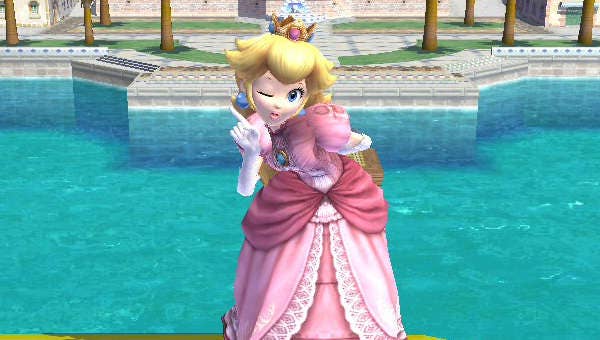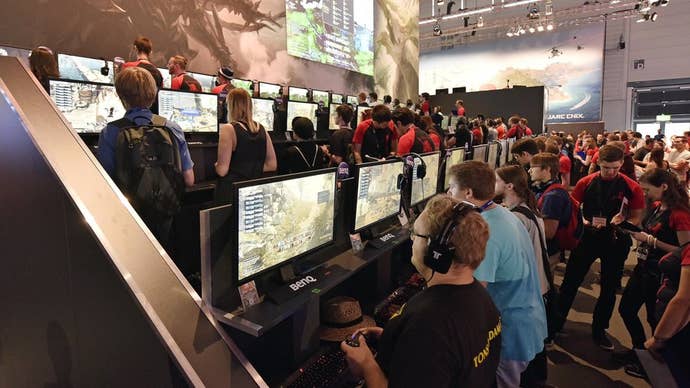Smashin' Squids: Is Nintendo Planning to Give eSports a Sporting Chance on the Switch?
Nintendo might be getting serious about eSports with the Switch, but it has to go all-in to make it work.
This article first appeared on USgamer, a partner publication of VG247. Some content, such as this article, has been migrated to VG247 for posterity after USgamer's closure - but it has not been edited or further vetted by the VG247 team.
If you're an older gamer who's a little set in their ways, you may feel like the gargantuan popularity of eSports body-checked the industry out of nowhere. One minute you were happily making Mario bounce across the Mushroom Kingdom, and the next minute Imagine Dragons was writing songs about the warrior spirit of League of Legends' players.
Truth is, eSports had been making headlines for years before Riot Games appeared on the fingertips of games writers. They just weren't making our headlines beyond fluff pieces declaring "Ha ha South Korea is craaaaazy about StarCraft!"
Now, eSports are far beyond fluff pieces and goofy headlines. They're incredibly serious business – literally. In 2016, Activision Blizzard acquired Major League Gaming (MLG), a competitive gaming group founded in 2002, for $46 million USD. Activision Blizzard aims to make MLG "The ESPN of eSports," and given the inherent enormity of the publisher, its reach is already impossible to ignore.
Even mainstream athletes and personalities now go to bat for eSports, which helps dispel the belief that they're not "real sports:" In 2015, Dallas Mavericks owner Mark Cuban fired back against mainstream sports pundit Colin Cowherd when Cowherd inferred eSports' participants are basement-dwelling nerds.
"I love Colin [Cowherd] but he's an idiot," Cuban said. "I'm a noob. I'm still getting into it, but I love it. It's like playing five-dimensional chess against the world. [League of Legends is] one of the smartest games I've ever played. You've got to have dexterity, and you've got to be quick. This is a real sport, and people are going to figure it out really, really quick."
It's probably not a coincidence competitive online multiplayer gaming became more popular as western countries' internet connections became faster and more stable. Anyone who remembers playing the original Counter-Strike or Subspace over 56k modems can understand why widespread access to solid 'net connections are kind of important for competitive gaming. It's also probably not a coincidence that the eSports boom started in South Korea, where the government has long advocated fast, cheap, and stable internet connections for all its citizens.

While major eSports tournaments are usually conducted in an arena (last year, the North American League of Legends finals filled Toronto's 19,800-seat Air Canada Centre to capacity), its spectators and fresh blood are drawn in through the Internet. LAN parties certainly had a hand in popularizing competitive gaming, but not everyone has the hardware to compete – or the stamina to drag their rig around. When the world became irrevocably wired together in 2010 and beyond, our appetite for digital bloodsport grew accordingly.
Is Nintendo in the fray?
So, eSports is here. It's huge. It's not going anywhere. What's Nintendo's position on the hype? Does it care about the frenzy, or will competitive play be yet another industry trend that slowly drifts down the river while it sits by and watches?
We probably won't see the latter scenario come to pass, thankfully. Nintendo definitely has a presence on the eSports scene. It's a small nook, but a very deep one. Competitive Smash Bros is no joke. East Point Pictures' The Smash Bros documentary and the trailer for the upcoming follow-up, Metagame, offer insight into how brutally-minded and razor-focused people can become when they're strategizing how to best hurl turnips at their rivals and then follow up with a devastating parasol-thump.
Splatoon, Nintendo's competitive shooting game featuring kids and squids, is likewise a popular choice in eSports arenas. Japan in particular has a burgeoning competitive community for Splatoon, and in 2016, Nintendo hosted a tournament with a $1 million USD payout. When the Switch's first trailer debuted on October 16 2016, there was a surprising bit of footage near the end where Splatoon is clearly being played competitively to thunderous applause and cheering.

Nintendo wouldn't dedicate a third of the most important trailer it's released in years to a pro-eSports message unless it was serious about Switch games being played competitively – would it? What does Nintendo have up its sleeve for eSports on the Nintendo Switch, and how can it make sure the console / handheld hybrid rises to relevance on the scene?
How Nintendo should Smash-and-Splat on the world stage
Alan Bunney MD is the CEO of Panda Global, a professional eSports team with a focus on Smash Bros, Splatoon, and Heroes of the Storm. In addition to his full-time job as a doctor, he manages players, Panda's social media accounts, helps arrange tournaments, and assists with the countless other problems and tasks that come with organizing competitive sports.
The mixed reaction the Switch received after Nintendo's New York event in January has Bunney a little skeptical about the Switch's long-term prospects, though he certainly hopes to see it gain widespread popularity.
"We really want the Switch to be massively successful, to help grow the Nintendo eSports audience, but we're not sure if Nintendo's vision is really clicking with the people right now," Bunney told me over email. "For it to survive long term there have to be some killer games. We know the usual Nintendo games are coming over 2017, as well as an exciting new one in Arms, but it doesn't seem like enough yet to really make the Switch a hit. We'll have to see what developers come up with."
Bunney did notice Nintendo is, without question, pushing to make Splatoon a serious contender in eSports, and he's stoked about it. "Being one of the only large teams in the world that has recognized the potential of Splatoon as an eSport, it was super exciting for us to see Nintendo dedicate time in their promo to Splatoon eSports," he says.
Bunney also points out the upcoming Splatoon 2 has a spectator mode, which was "the key missing element from Splatoon. Now the scene is set to explode."
Spectator mode, as its name suggests, lets viewers take in competitors' moves. As with physical sports, setting up a spectator mode isn't as easy as programming an occasional switch between a few camera angles. Nintendo's decision to implement it into Splatoon 2 – as well as a LAN mode – bodes well for its future as an eSport.

Nintendo will need to make sure its hardware and software are robust enough for the eSports scene, however. There is no negotiation on this front, no corners to cut. As Bunney notes, Nintendo consoles like the Wii, Wii U, DS, and 3DS are not renowned for stellar online performance. There's lag, there's stuttering, and sometimes there's just a heck of a lot of waiting. That's unacceptable for competitive play.
"No Nintendo console to date has had a robust online capacity for their titles at launch in the past," he says, "and even titles like Splatoon took many months before they received a downloadable online competitive mode. If Nintendo is serious about eSports, these are things that need to be strong from the get-go."
Juan "Hungrybox" Debiedma, a world-famous Super Smash Bros Melee player for Team Liquid, concurs on the need for Nintendo to make sure its connectivity for the Switch is up to snuff. "I would make sure that online play is absolutely optimized," he told me over email "I would be willing to pay monthly for lagless online competitions (we've since learned the Switch's online service will indeed be paid, but "lagless" is yet to be determined)."
As one of the world's best Smash players, Hungrybox also hopes Nintendo will find a way to add GameCube support to whichever Smash titles inevitably come out for the system. Nintendo, like life, will surely find a way.
Nintendo and eSports: Why bother, anyway?
eSports aficionados appear to be cautiously optimistic about seeing an increase of Switch games in eSports arenas. Going by Nintendo's own ads and actions, it's clear they have plans. It's all very interesting to observe if you're a Nintendo fan: The company is notoriously conservative about latching onto hot industry trends. Just look at how long it took for Nintendo properties to trudge onto mobile.
What's different about eSports? Why is Nintendo seemingly less reluctant to embrace large-scale competitive play?
It may be because Nintendo has nothing to lose by increasing its presence in eSports. Aside from the obvious free advertising and community-building it provides, competitors are drawn to the likes of Splatoon and Smash Bros because it's so different, so niche, compared to other popular eSports games. Players must conform to the rules Nintendo implements into its hardware and software.
By contrast, Nintendo gives up some measure of control when it makes mobile games. If three generations of cartridge-based systems taught us anything, it's that Nintendo hates relinquishing control to follow the pack.

Nintendo may also see a lot of potential in the younger / casual eSports market. The company has several cross-media ventures in the works that aim to cultivate Nintendo fans outside of the walled gaming garden. Frankly, even though the eSports scene is quite young, it's an incredibly dense and intimidating community to break into. Nintendo's bright colors, intuitive games, and highly recognizable characters are sure to attract potential competitors who aren't sure where to start.
Eric Laney, a caster with Overwatch University, believes Nintendo needs to readily communicate with both the older and younger members of Splatoon's competitive community if it wants to become – and remain – a respectable presence in eSports.
"[Nintendo needs to] hire a team to be a liaison between the development team and the community to make sure they're doing what's best for the community and the growth of [Splatoon] in the eSports world," he told me over email. "People casting and people streaming [Splatoon] will get people wanting to watch the game as an eSport."
One thing would theoretically lead to another, and young Splatoon spectators would become players. "[There should be] a 'Junior Level' for kids who want to play games competitively in a fun environment," he says. "How cool would THAT be?"
You're a kid now, you're a champion now
There are definite signs that Nintendo aims to take eSports seriously, albeit with a narrower focus than other publishers. But even if it intends to enter the arena in a limited capacity, it needs to listen to its community, implement its suggestions, and persist, persist, persist.
"Nintendo needs to listen hard at what the community has to say, and implement the better ideas," says Laney. "[It] needs to stay focused on building up Splatoon in the eSports world, and have a team dedicated to making it the best it can be. If they stuck to it (…) they could take what they learned from the Splatoon league and expand it for other games."
One thing's for sure: Nintendo's calming touch wouldn't be unwelcome in the frenzied world of eSports. Let's hope Nintendo recognizes the importance of what it has to offer, and nurses that spark accordingly.

